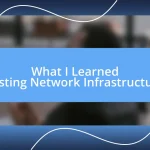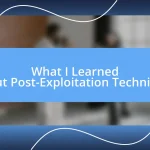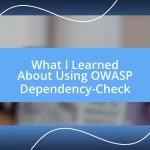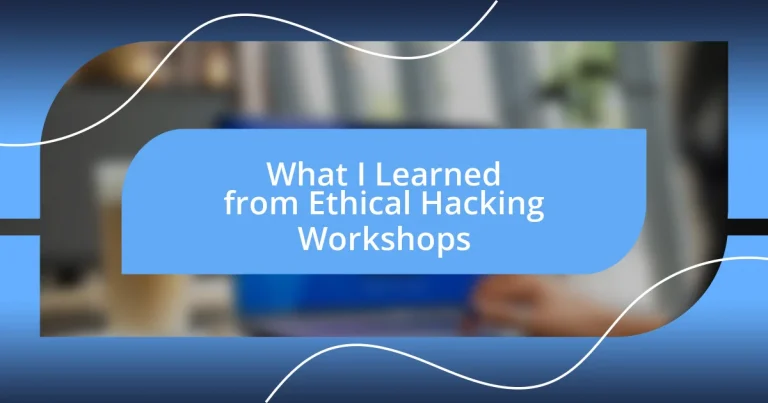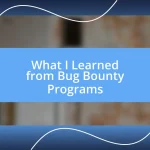Key takeaways:
- Ethical hacking workshops enhance practical skills like vulnerability assessment, penetration testing, and incident response, fostering a proactive mindset towards cybersecurity challenges.
- Hands-on experience with tools such as Wireshark and Metasploit emphasizes the significance of understanding cybersecurity techniques like SQL injection and phishing.
- Networking in cybersecurity builds genuine connections, opens collaboration opportunities, and enables collective empowerment in educating others about online safety.
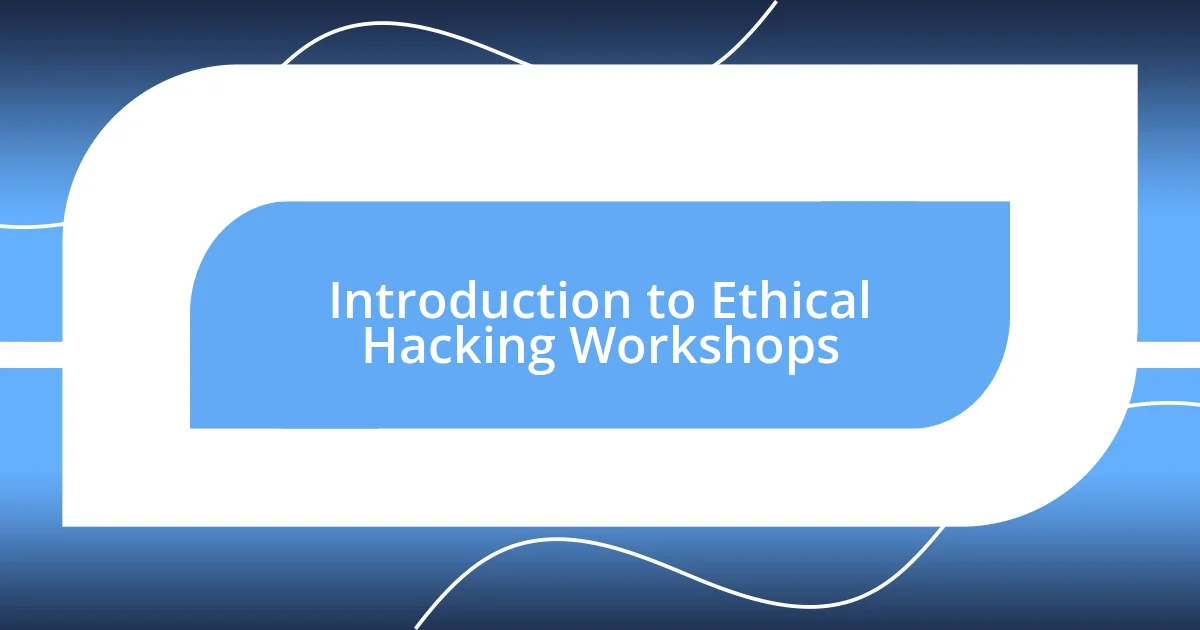
Introduction to Ethical Hacking Workshops
Ethical hacking workshops are more than just skill-building sessions; they’re gateways into a dynamic world where cybersecurity intertwines with creativity. I remember my first workshop as if it were yesterday. The moment I tapped into the mindset of an ethical hacker, it felt like stepping into a thrilling detective story, unraveling the mysteries of cybersecurity.
These workshops cultivate a hands-on approach, allowing participants to dive into real-world scenarios. Can you recall the rush of solving puzzles or overcoming challenges? I still feel the adrenaline when I think about the simulation exercises we tackled. There’s something incredibly empowering about knowing that these skills can protect others and enhance overall digital security.
Engagement is key, and these workshops often facilitate discussions that bring together people from varied backgrounds. I recall chatting with a professional who switched careers from marketing to cybersecurity, and it struck me how diverse this field truly is. Such networking not only broadens your perspective; it also shows you the versatility and opportunities within ethical hacking.
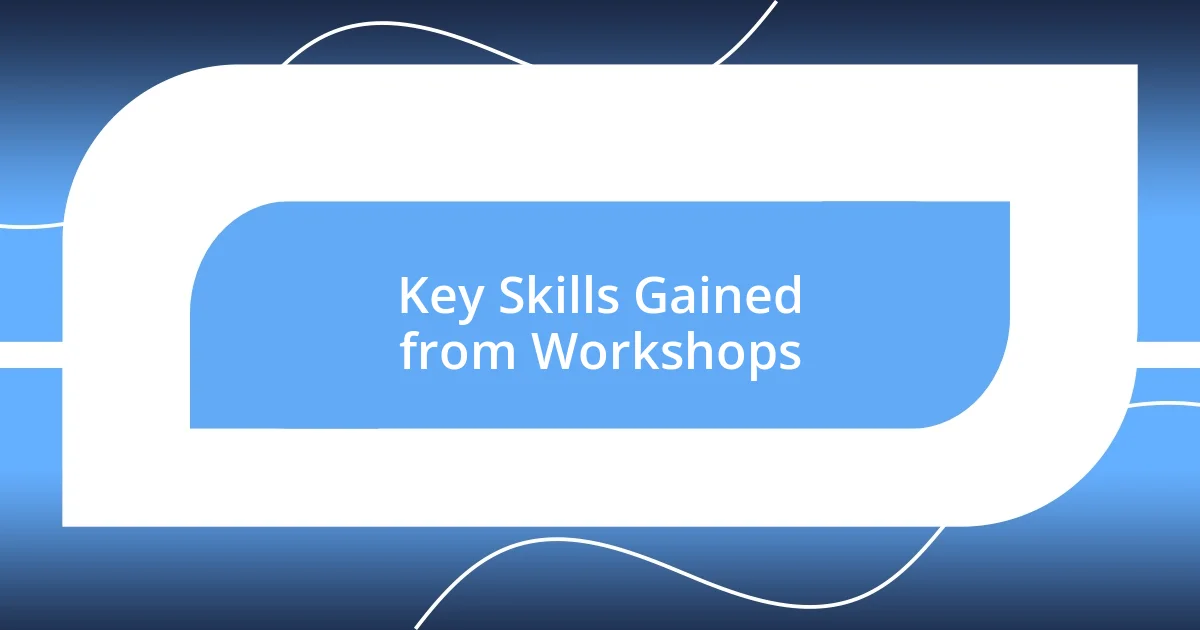
Key Skills Gained from Workshops
Participating in ethical hacking workshops significantly enhanced my technical skills, transforming them from abstract concepts into practical applications. I recall the meticulousness required while learning to analyze vulnerabilities. The feeling of systematically unraveling a potential security breach was exhilarating, comparable to fitting together the last pieces of a complex puzzle.
Here are some key skills I’ve gained from these workshops:
- Vulnerability Assessment: The ability to identify and evaluate gaps within systems that could be exploited by malicious hackers.
- Penetration Testing: Practical experience in simulating attacks to test the security of systems, helping refine defense strategies.
- Security Protocols: Understanding industry-standard practices for safeguarding information, which is critical for crafting better security measures.
- Incident Response: Skills in quickly identifying and responding to security threats, ensuring minimal damage during an attack.
- Networking Skills: Building relationships with fellow attendees and instructors, which has opened doors to collaborative opportunities in the cybersecurity field.
As I dove deeper into the ethical hacking mindset, I found myself developing an analytical approach to problem-solving. It became less about just knowing the tools and more about cultivating an intuition for when and how to deploy them. I vividly remember a hands-on exercise where we had to analyze a compromised system. The tension in the room was palpable, yet the collective focus was invigorating. By the end, we’d not only discovered the intruder’s methods but also developed strategies to mitigate future risks, leaving me with a profound sense of accomplishment and understanding.
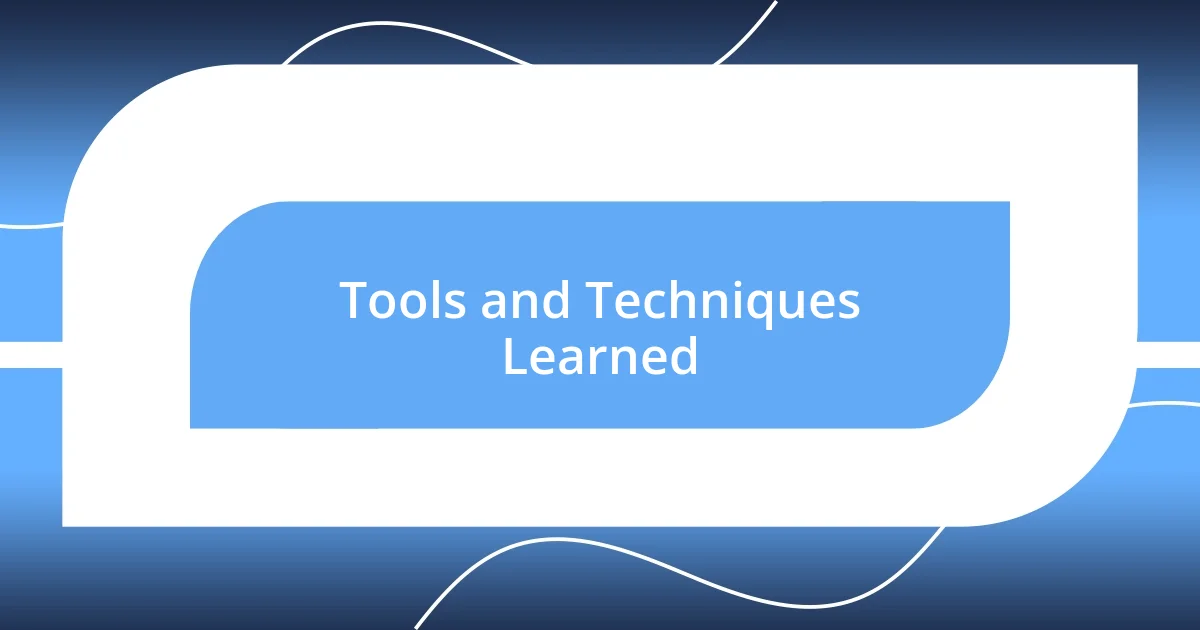
Tools and Techniques Learned
The tools and techniques I learned during ethical hacking workshops truly expanded my understanding of cybersecurity. For instance, I got hands-on experience with tools like Wireshark for network analysis and Metasploit for penetration testing. The first time I used Metasploit to exploit a vulnerability, my heart raced; it felt like being in a high-stakes game where every move mattered.
During these sessions, I learned the significance of techniques such as SQL injection and phishing simulations. I remember one exercise that involved creating a mock phishing email. Crafting the message was a creative challenge, but it also highlighted how easy it is to manipulate unsuspecting users. This realization deepened my understanding of the human element in cybersecurity.
Each tool serves a unique purpose, and knowing when to use them is essential. Here’s a quick comparison of some essential tools and techniques I encountered during the workshops:
| Tool/Technique | Purpose |
|---|---|
| Wireshark | Network traffic analysis |
| Metasploit | Penetration testing framework |
| Burp Suite | Web vulnerability scanning |
| Nmap | Network discovery and mapping |
| Kali Linux | Penetration testing OS |
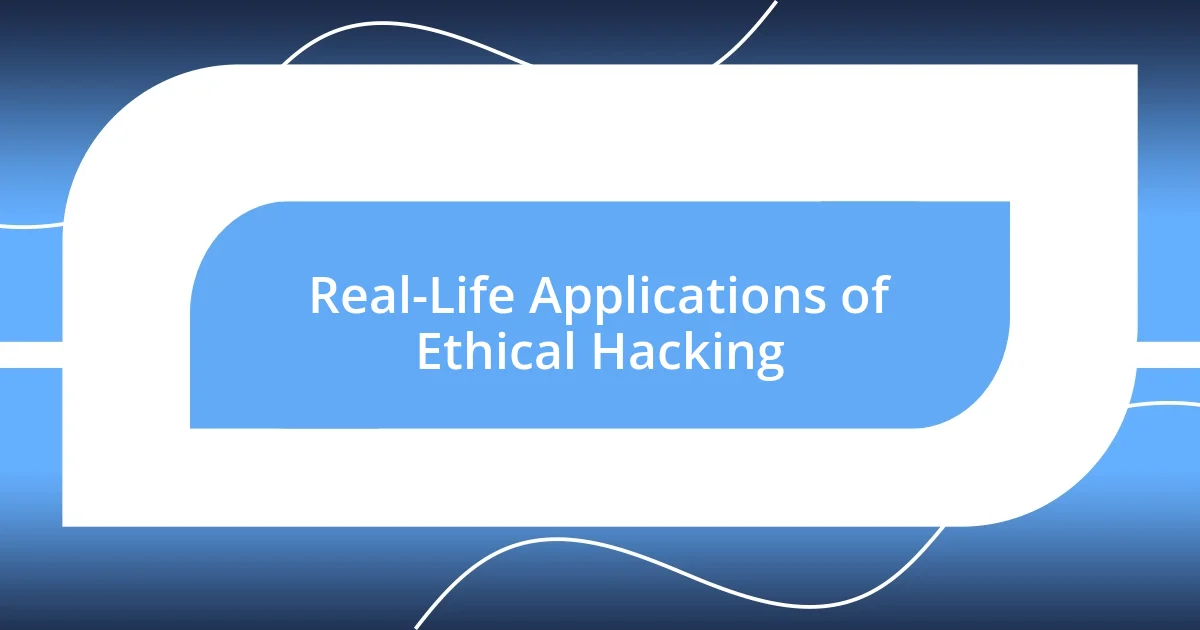
Real-Life Applications of Ethical Hacking
Ethical hacking has real-life applications that extend well beyond the confines of workshops. I recall a project where we simulated an attack on a local business’s network. Watching the team come together to protect sensitive customer data from potential breaches made it clear how vital our skills are in the real world. It was like being in a high-stakes mission; every decision we made had tangible consequences.
In another instance, I became involved in assessing a non-profit organization’s online security. By conducting a thorough vulnerability assessment, we identified multiple potential threats that could have jeopardized their operations. The urgency was palpable as we presented our findings. The relief on their faces when we shared our recommendations was incredibly rewarding. This experience highlighted how ethical hacking isn’t just about finding weaknesses—it’s about empowering organizations to fortify their defenses.
Reflecting on my workshops, I often think: how can a single ethical hacking initiative create ripples of change? Every time we secure a system, a cascading effect occurs, protecting not just that specific entity but also its clients, users, and partners. It’s a powerful reminder that our work as ethical hackers contributes to a broader mission of safeguarding our digital landscape, and that’s a commitment I take to heart.
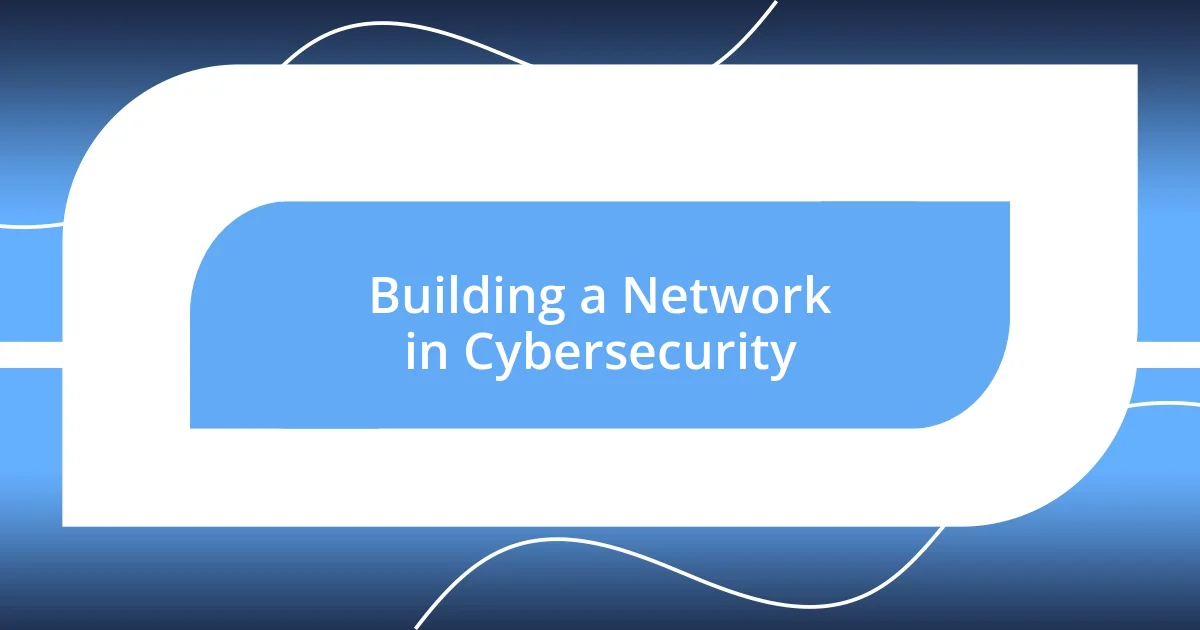
Building a Network in Cybersecurity
Building a network in cybersecurity isn’t just about exchanging business cards; it’s about forming genuine connections. I remember attending a workshop where we had breakout sessions, allowing us to share experiences and insights. It was remarkable how one conversation led to a collaboration on a cybersecurity project that opened doors I never imagined possible. Isn’t it fascinating how sharing knowledge can build bridges?
Networking also goes beyond just meeting professionals. I once partnered with a fellow attendee on a community outreach program aimed at educating high school students about online safety. This initiative not only reinforced our own skills but also empowered the next generation—talk about a rewarding experience! Have you ever thought about how your network can create opportunities for teaching and learning?
As I navigated these workshops, I realized the importance of maintaining relationships with mentors and peers. One of my mentors has been a guiding light, always ready to share industry insights and opportunities. I still remember the warmth in her voice when she offered to review my resume after our first interaction. Isn’t it incredible how mentorship and support can shape our careers in such impactful ways?
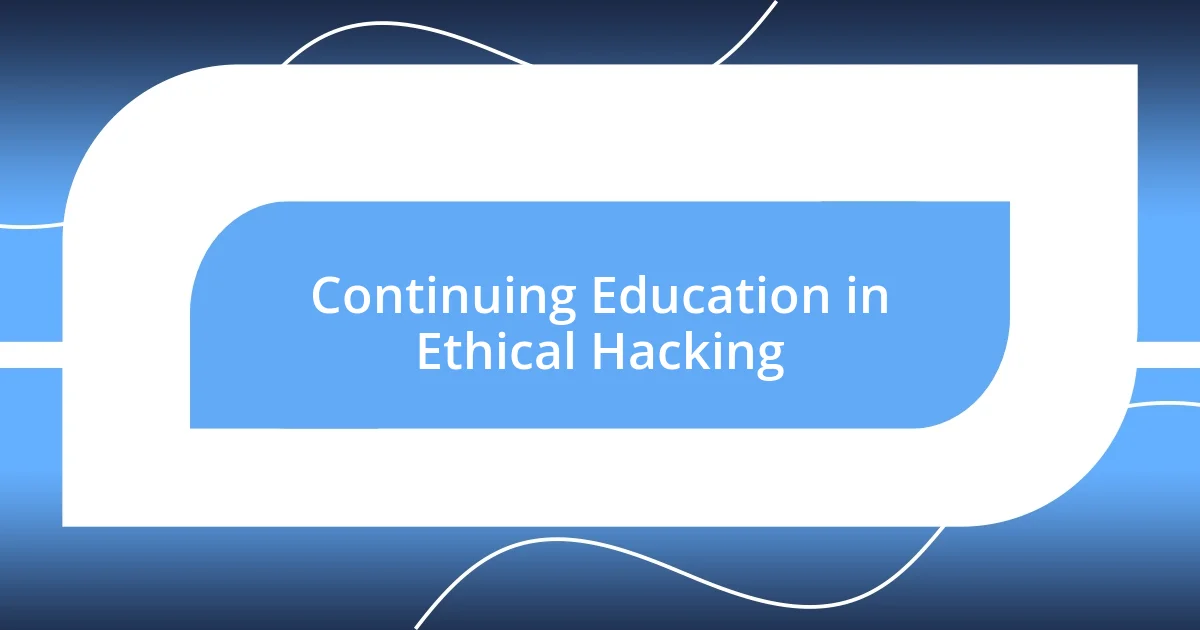
Continuing Education in Ethical Hacking
Continuing education in ethical hacking is crucial for anyone looking to stay relevant in this fast-paced field. I once attended an intensive workshop focused on the latest penetration testing tools. The excitement in the room was palpable as we explored how these tools could expose vulnerabilities in real-world systems. I walked away not only with new skills but also a sense of empowerment—I had the knowledge to make a difference.
I often think about how quickly technology evolves and how our education must keep pace. During a recent online course, I encountered a module on social engineering tactics. It was eye-opening to discover how easily human psychology can be manipulated in cyberattacks. How often do we underestimate the human element in security? This realization pushed me to delve deeper into understanding cybersecurity from a holistic perspective, not just focusing on technical skills.
The importance of continuous learning in ethical hacking cannot be overstated. In my journey, I’ve also joined webinars where industry leaders share insights about emerging threats. One speaker recounted a harrowing experience with a data breach, emphasizing the importance of preventive education. Hearing these stories reinforces why I actively seek out new learning opportunities. Isn’t it amazing how stories can ignite our passion for knowledge and create a more profound commitment to our craft?





